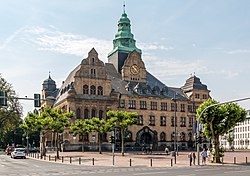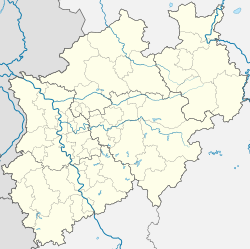This article needs additional citations for verification. (August 2018) |
Recklinghausen (German pronunciation: [ˌʁɛklɪŋˈhaʊzn̩] ⓘ; Westphalian: Riäkelhusen) is the northernmost city in the Ruhr-Area and the capital of the Recklinghausen district. It borders the rural Münsterland and is characterized by large fields and farms in the north and industry in the south. Recklinghausen is the 60th-largest city in Germany and the 22nd-largest city in North Rhine-Westphalia.
Recklinghausen
Riäkelhusen (Westphalian) | |
|---|---|
 City hall | |
Location of Recklinghausen within Recklinghausen district  | |
| Coordinates: 51°35′6″N 7°9′43″E / 51.58500°N 7.16194°E | |
| Country | Germany |
| State | North Rhine-Westphalia |
| Admin. region | Münster |
| District | Recklinghausen |
| Government | |
| • Mayor (2020–25) | Christoph Tesche[1] (CDU) |
| Area | |
• Total | 66.4 km2 (25.6 sq mi) |
| Elevation | 85 m (279 ft) |
| Population (2023-12-31)[2] | |
• Total | 111,693 |
| • Density | 1,700/km2 (4,400/sq mi) |
| Time zone | UTC+01:00 (CET) |
| • Summer (DST) | UTC+02:00 (CEST) |
| Postal codes | 45601–45665 |
| Dialling codes | 02361 |
| Vehicle registration | RE |
| Website | www.recklinghausen.de (in German) |
History
editFirst mentioned in 1017 as Ricoldinchuson, in 1150 the city was the center of the surrounding Vest Recklinghausen. In 1236, Recklinghausen received town privileges. There is record of Jews in the city as early as 1305.[3] As part of the County of Vest, ownership of Recklinghausen changed several times in the 15th and 16th century, and in 1576, the entire county was pawned to the Elector of Cologne. In 1582–83, again in 1586, and again in 1587, the city was plundered by partisan armies during the Cologne War, a feud over religious parity in Electorate of Cologne and electoral influence in the Holy Roman Empire.
Recklinghausen was also the site of more than 100 witchcraft trials (1514–1710).[citation needed] The trial activity reached a climax twice: In the time period of 1580/81 and again in 1588/89. The last person to be convicted of witchcraft was Anna Spickermann; after spending 16 months in prison, she was sentenced to death by sword and burned afterward.
c. 1600, the administration of the Vest Recklinghausen was divided into two parts, with the eastern part administered by Recklinghausen. The town of Recklinghausen including the parish of Recklinghausen and the parishes Ahsen, Datteln, Flaesheim, Hamm-Bossendorf, Henrichenburg, Herten, Horneburg, Oer, Suderwich, Waltrop and Westerholt. In 1803-1811 became the capital of a sovereign Principality of the Dukes of Arenberg who retain the title. c. 1815, the Vest was made a Bürgermeisterei, with the town becoming the seat. In 1819, Herten joined the Recklinghausen Bürgermeisterei, and Erkenschwick followed in 1821.
During World War II, in December 1939, the Stalag XX-B prisoner-of-war camp was founded in the city, however, it was relocated after a few days,[4] and from 1941 to 1943, a forced labour camp was operated in the city.[5] As a target of the Oil Campaign of World War II, oil production at Recklinghausen/Forstezung was bombed by the RAF on 15 January 1945; and South Recklinghausen (Recklinghausen Süd) was captured by the US 137th Infantry on 1 April 1945.[6]
Main sights
editRecklinghausen is home to a museum of icons, which includes more than 1,000 Orthodox works from Russia, Greece and the Balkan countries, as well as early Coptic Christian art from Egypt. The icon museum – the largest outside the Orthodox world – was founded in 1956 and reopened after renovation in February 2006 for its 50th anniversary.
The Ruhrfestspielhaus (Ruhr Festival Theatre), whose remodeling in 2001 won the German Architecture Award is home of "Die Liegende Nr 5", a famous sculpture by Henry Moore. At the Lohtor in front of a memorial for the victims of World War I, there is a large sculpture made of more than 30,000 bricks by Per Kirkeby.
Annual events
editRecklinghausen hosts the annual Ruhrfestspiele (Ruhr Festival), a cultural festival with an international reputation. Every year there is a cultural programme with many national and international theatrical productions starting on 1 May. In 2008 the programme included the play Speed the Plow starring Kevin Spacey and Jeff Goldblum as one of the major productions. The main theatrical stage is the Ruhrfestspielhaus but other theatres in and around Recklinghausen participate.
Transport
editThe two major motorways crossing the area of the city are the A2 and the A43. The city is connected to the larger waterways by the Rhein-Herne-Kanal. Recklinghausen has two railway stations. The Central Station (Recklinghausen Hauptbahnhof), which is served by Intercity and EuroCity services, and the South Station (Recklinghausen Südbahnhof).
There are two Rhine-Ruhr S-Bahn lines - S 2 to Dortmund via Herne - Castrop-Rauxel and S 9 to Hagen via Gladbeck - Bottrop - Essen - Velbert - Wuppertal.
Politics
editMayor
editThe current mayor of Recklinghausen is Christoph Tesche of the Christian Democratic Union (CDU). The most recent mayoral election was held on 13 September 2020, and the results were as follows:
| Candidate | Party | Votes | % | |||
|---|---|---|---|---|---|---|
| Christoph Tesche | Christian Democratic Union | 26,556 | 60.8 | |||
| Andreas Becker | Social Democratic Party | 7,286 | 16.7 | |||
| Thorben Terwort | Alliance 90/The Greens | 4,031 | 9.2 | |||
| Sascha Menkhaus | Alternative for Germany | 2,264 | 5.2 | |||
| Erich Burmeister | The Left | 1,493 | 3.4 | |||
| Claudia Ludwig | Independent Citizens Party | 1,213 | 2.8 | |||
| Irina Oberpichler | Die PARTEI | 864 | 2.0 | |||
| Valid votes | 43,707 | 99.0 | ||||
| Invalid votes | 435 | 1.0 | ||||
| Total | 44,142 | 100.0 | ||||
| Electorate/voter turnout | 92,107 | 47.9 | ||||
| Source: City of Recklinghausen Archived 2020-10-08 at the Wayback Machine | ||||||
City council
editThe Recklinghausen city council governs the city alongside the Mayor. The most recent city council election was held on 13 September 2020, and the results were as follows:
| Party | Votes | % | +/- | Seats | +/- | |
|---|---|---|---|---|---|---|
| Christian Democratic Union (CDU) | 16,078 | 37.0 | 0.6 | 21 | 2 | |
| Social Democratic Party (SPD) | 10,924 | 25.2 | 12.8 | 14 | 6 | |
| Alliance 90/The Greens (Grüne) | 7,757 | 17.9 | 8.3 | 10 | 5 | |
| Alternative for Germany (AfD) | 2,861 | 6.6 | New | 4 | New | |
| The Left (Die Linke) | 1,867 | 4.3 | 1.7 | 2 | 1 | |
| Free Democratic Party (FDP) | 1,561 | 3.6 | 0.4 | 2 | ±0 | |
| Independent Citizens' Party (UBP) | 1,477 | 3.4 | 3.4 | 2 | 1 | |
| Die PARTEI | 614 | 1.4 | New | 1 | New | |
| Ecological Democratic Party (ÖDP) | 199 | 0.5 | New | 0 | New | |
| Party of Holistic Democracy (PHD) | 103 | 0.2 | New | 0 | New | |
| Valid votes | 43,441 | 98.4 | ||||
| Invalid votes | 687 | 1.6 | ||||
| Total | 44,128 | 100.0 | 56 | 4 | ||
| Electorate/voter turnout | 92,107 | 47.9 | 0.4 | |||
| Source: City of Recklinghausen Archived 2021-09-23 at the Wayback Machine | ||||||
Twin towns – sister cities
editNotable people
edit- Louis Engelbert, 6th Duke of Arenberg (1750–1820), prince of Recklinghausen
- Prosper Louis, 7th Duke of Arenberg (1785–1861), 2nd prince of Recklinghausen
- Fritz Emil Irrgang (1890–1951), Nazi politician and storm trooper
- Walter Giller (1927–2011), actor
- Karl Ridderbusch (1932–1997), opera singer
- Ursula Dirichs (born 1935), actress
- Rosemarie Koczy (1939–2007), artist and teacher, concentration camp survivor
- Klaus Schulten (1947–2016), biophysicist
- Renate Künast (born 1955), politician (Alliance 90/The Greens)
- Ralf Möller (born 1959), actor
- Ludger Pistor (born 1959), actor
- Hape Kerkeling (born 1964), comedian and author
- Steffen Brand (born 1965), runner
- Martin Max (born 1968), footballer
- Mark Dragunski (born 1970), handball player
- Moguai (born 1973), DJ and producer
- Frank Busemann (born 1975), decathlete
- Thomas Godoj (born 1978), Polish-German singer, Deutschland sucht den Superstar winner
- Nina Jazy (born 2005), swimmer
Mayors since 1809
edit- Bürgermeister
- 1809–1833: Alois Joseph Wulff
- 1833–1839: Peter Banniza
- 1840–1842: Karl Boelmann
- 1843–1850: Franz Bracht
- 1854–1890: Friedrich Hagemann
- 1890–1899: Alexander Rensing
- Oberbürgermeister
- 1899–1904: Albert von Bruchhausen
- 1904–1919: Peter Heuser
- 1919–1931: Sulpiz Hamm
- 1932–1939: Fritz Niemeyer
- 1939–1945: Fritz Emil Irrgang, NSDAP
- 1945–1946: Josef Hellermann, CDU
- 1946–1948: Wilhelm Bitter, CDU
- 1948–1952: Joseph Dünnebacke, CDU
- 1952–1972: Heinrich Auge, SPD
- 1972–1984: Erich Wolfram, SPD
- Bürgermeister
- 1984–1987: Erich Wolfram, SPD
- 1987–1998: Jochen Welt, SPD
- Hauptamtliche Bürgermeister
- 1998–1999: Peter Borggraefe, SPD
- 1999–2014: Wolfgang Pantförder, CDU
- 2014–2025: Christoph Tesche, CDU[8]
Gallery
edit-
Central market
-
Lohtor Square with Saint Peter's Church and sculpture of Per Kirkeby
-
Former hospital in Westviertel
-
Half-timber houses in the city
-
The "Palais Vest" shopping mall
-
City wall from the Middle Ages
References
edit- ^ Wahlergebnisse in NRW Kommunalwahlen 2020, Land Nordrhein-Westfalen, accessed 29 June 2021.
- ^ "Bevölkerung der Gemeinden Nordrhein-Westfalens am 31. Dezember 2023 – Fortschreibung des Bevölkerungsstandes auf Basis des Zensus vom 9. Mai 2011" (in German). Landesbetrieb Information und Technik NRW. Retrieved 2024-06-20.
- ^ "The Jewish Community of Recklinghausen". Beit Hatfutsot Open Databases Project. The Museum of the Jewish People at Beit Hatfutsot.
- ^ Daniluk, Jan (2012). "Wykorzystanie siły roboczej jeńców wojennych w XX Okręgu Wojskowym w latach II wojny światowej (zarys problemu)". Łambinowicki rocznik muzealny (in Polish). 35. Opole: 21.
- ^ "Arbeitserziehungslager Recklinghausen". Bundesarchiv.de (in German). Retrieved 12 March 2023.
- ^ "The Central Europe Campaign, Page 3 - The 35th Infantry Division in World War Two". www.35thinfdivassoc.com. Retrieved 28 December 2017.
- ^ "Städtepartnerschaften". recklinghausen.de (in German). Recklinghausen. Retrieved 2021-03-15.
- ^ "Bürgermeister - Stadt Recklinghausen". www.recklinghausen.de. Retrieved 28 December 2017.


